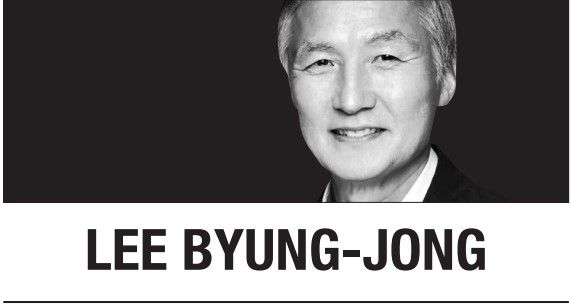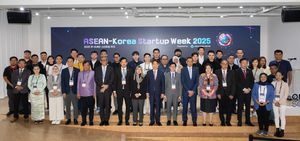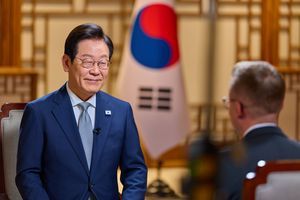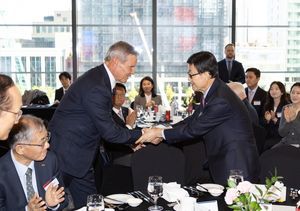 After a series of twists and turns, Japan’s National Diet has finally elected its first female prime minister. Takaichi Sanae, 64, secured the premiership this week after forming a ruling coalition with a minority party, following the recent breakup of her Liberal Democratic Party’s decadeslong alliance. Her political ascent in highly patriarchal Japan is remarkable, but observers now wonder whether a female leader in such a male-dominated society can truly deliver on her promises. Her political fate is being closely watched across the world — particularly in neighboring South Korea, where the country’s first female head of state, former President Park Geun Hye, ended her tenure in disgrace after impeachment.
After a series of twists and turns, Japan’s National Diet has finally elected its first female prime minister. Takaichi Sanae, 64, secured the premiership this week after forming a ruling coalition with a minority party, following the recent breakup of her Liberal Democratic Party’s decadeslong alliance. Her political ascent in highly patriarchal Japan is remarkable, but observers now wonder whether a female leader in such a male-dominated society can truly deliver on her promises. Her political fate is being closely watched across the world — particularly in neighboring South Korea, where the country’s first female head of state, former President Park Geun Hye, ended her tenure in disgrace after impeachment.
Female political leaders in conservative Asia are not new, but their legacies are decidedly mixed. One success story is former Taiwanese President Tsai Ing-wen, who stood firmly for her country’s democracy and de facto independence. Indira Gandhi of India and Corazon Aquino of the Philippines are also remembered for their contributions to nation-building and democratic restoration, respectively. Yet their legacies are sometimes discounted because both rose to power partly through family or dynastic ties — unlike most female leaders in the West, such as Margaret Thatcher of Britain or Angela Merkel of Germany, who ascended primarily through their own political merit.
Benazir Bhutto of Pakistan and Megawati Sukarnoputri of Indonesia also made history as female leaders in Muslim-majority countries where women’s rights are restricted. Yet again, both benefited from their fathers’ political legacies. Another notable case is Aung San Suu Kyi of Myanmar, the daughter of a national hero, who won the Nobel Peace Prize for her nonviolent struggle for democracy. She was later discredited for her silence during the Rohingya crisis, when Muslim minorities were brutally persecuted and expelled by the military dictatorship.
Having often risen to power through family connections rather than individual merit, most Asian female leaders have struggled to leave enduring legacies. Perhaps with the exception of Taiwan’s Tsai, their accomplishments were modest. Many focused on “soft” issues such as health, education and welfare, while avoiding or failing to achieve deeper political and economic reforms in the face of entrenched societal resistance. Gender inequality remains deeply rooted across the region. Today, women make up only about 20 percent of parliamentarians in Asia, compared with 40 percent in Europe and 30 percent in Africa and the Americas, according to the Inter-Parliamentary Union. Gender disparity is also prominent in Asian businesses.
Within Asia, disappointment with female leadership is perhaps strongest in South Korea. When President Park Geun Hye was inaugurated in 2013 as the first female leader in Northeast Asia — which includes Japan and China — expectations were sky-high for gender reform and broader modernization. Park Chung-hee, her father, is credited with spearheading South Korea’s economic miracle, which gave rise to hopes that she would continue his legacy of economic success.
Yet Park’s nearly five-year presidency was marred by corruption scandals that ultimately led to her impeachment and imprisonment. For many feminist activists who had long campaigned for gender equality, her fall from grace was a devastating setback. In the three presidential elections since her ouster, there have been no serious female contenders — suggesting that Korea’s clock on gender equality may have turned back.
As for Japan’s new prime minister, Takaichi Sanae, expectations are mixed. On the positive side, she rose to power through political and bureaucratic experience rather than family connections. As a college student, she was a free-spirited young woman who rode motorcycles and played drums in a heavy metal band. Inspired by Thatcher, her long-time role model, Takaichi has shown resilience through numerous electoral defeats before finally breaking Japan’s formidable glass ceiling — earning her the nickname Japan’s Iron Lady.
Yet her political stance remains deeply conservative. She holds revisionist views of Japan’s wartime history and has in the past visited the Yasukuni Shrine, which honors Japan’s Class-A war criminals — moves that have alarmed both Korea and China. She supports constitutional revision to strengthen Japan’s military, another policy that unsettles its neighbors. As a protege of the late Prime Minister Abe Shinzo, her right-wing orientation is likely to strain Tokyo’s ties with Seoul. Her coalition partner, the ultraconservative Japan Innovation Party, reinforces that image.
On social issues, Takaichi is far from progressive. She opposes same-sex marriage and favors tighter restrictions on immigrants. Advocacy for women’s rights and gender equality has not been a hallmark of her platform. She supports the imperial family’s male-only succession and is against separate surnames for married couples. Even if she were inclined to pursue bold social reforms, her ability to do so is limited by her coalition’s lack of a parliamentary majority, forcing her to compromise on controversial legislation.
Japan’s new leader thus faces a defining choice: Will she follow in the footsteps of successful Asian female leaders like Taiwan’s Tsai by making audacious efforts to reform Japan’s conservative society? Or will she succumb to the weight of entrenched tradition and become yet another case of failed female leadership in Asia, as seen with Korea’s Park?
Only time will tell which path she chooses.
Lee Byung-jong
Lee Byung-jong is a former Seoul correspondent for Newsweek, The Associated Press and Bloomberg News. He is a professor at the School of Global Service at Sookmyung Women’s University in Seoul. The views expressed here are the writer’s own. — Ed.
- 2 NK soldiers briefly cross MDL to apparently chase defecting soldier: sources
- Hybe partners with LAFC
- N. Korea breaks ground on memorial museum for its troops killed in Russia’s war with Ukraine
- Seoul shares open sharply higher on eased US-China tensions
- Lee says ‘carefully’ reviewing impact on financial markets during US tariff talks










Most Commented